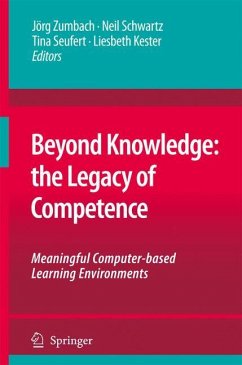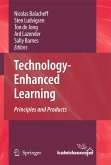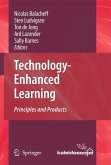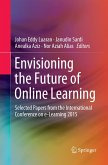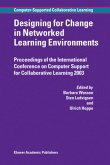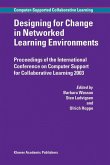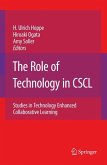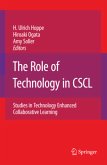Beyond Knowledge: The Legacy of Competence
Meaningful Computer-based Learning Environments
Herausgegeben:Zumbach, Jörg; Schwartz, Neil; Seufert, Tina; Kester, Liesbeth
Beyond Knowledge: The Legacy of Competence
Meaningful Computer-based Learning Environments
Herausgegeben:Zumbach, Jörg; Schwartz, Neil; Seufert, Tina; Kester, Liesbeth
- Broschiertes Buch
- Merkliste
- Auf die Merkliste
- Bewerten Bewerten
- Teilen
- Produkt teilen
- Produkterinnerung
- Produkterinnerung
The edited and peer reviewed volume presents selected papers of the conference "Beyond knowlegde: the legacy of competence" organized by EARLI SIG Learning and Instruction with Computers in cooperation with SIG Instructional Design. It reflects the current state-of-the-art work of scholars worldwide within the area of learning and instruction with computers. Mainly, areas of computer-based learning environments supporting competence-focused knowledge acquisition but also foundational scientific work are addressed. More specific, contents cover cognitive processes in hypermedia and multimedia…mehr
Andere Kunden interessierten sich auch für
![Technology-Enhanced Learning Technology-Enhanced Learning]() Technology-Enhanced Learning166,99 €
Technology-Enhanced Learning166,99 €![Technology-Enhanced Learning Technology-Enhanced Learning]() Technology-Enhanced Learning168,99 €
Technology-Enhanced Learning168,99 €![Envisioning the Future of Online Learning Envisioning the Future of Online Learning]() Envisioning the Future of Online Learning151,99 €
Envisioning the Future of Online Learning151,99 €![Designing for Change in Networked Learning Environments Designing for Change in Networked Learning Environments]() B. Wasson / Sten Ludvigsen / Ulrich Hoppe (eds.)Designing for Change in Networked Learning Environments153,99 €
B. Wasson / Sten Ludvigsen / Ulrich Hoppe (eds.)Designing for Change in Networked Learning Environments153,99 €![Designing for Change in Networked Learning Environments Designing for Change in Networked Learning Environments]() Designing for Change in Networked Learning Environments152,99 €
Designing for Change in Networked Learning Environments152,99 €![The Role of Technology in CSCL The Role of Technology in CSCL]() Ulrich Hoppe / Amy Soller / Hiroaki Ogata (eds.)The Role of Technology in CSCL76,99 €
Ulrich Hoppe / Amy Soller / Hiroaki Ogata (eds.)The Role of Technology in CSCL76,99 €![The Role of Technology in CSCL The Role of Technology in CSCL]() The Role of Technology in CSCL112,99 €
The Role of Technology in CSCL112,99 €-
-
-
The edited and peer reviewed volume presents selected papers of the conference "Beyond knowlegde: the legacy of competence" organized by EARLI SIG Learning and Instruction with Computers in cooperation with SIG Instructional Design. It reflects the current state-of-the-art work of scholars worldwide within the area of learning and instruction with computers. Mainly, areas of computer-based learning environments supporting competence-focused knowledge acquisition but also foundational scientific work are addressed. More specific, contents cover cognitive processes in hypermedia and multimedia learning, social issues in computer-supported collaborative learning, motivation and emotion in Blended Learning and e-Learning.
Produktdetails
- Produktdetails
- Verlag: Springer / Springer Netherlands
- Artikelnr. des Verlages: 978-90-481-7999-2
- Softcover reprint of hardcover 1st ed. 2008
- Seitenzahl: 320
- Erscheinungstermin: 19. Oktober 2010
- Englisch
- Abmessung: 235mm x 155mm x 18mm
- Gewicht: 487g
- ISBN-13: 9789048179992
- ISBN-10: 9048179998
- Artikelnr.: 32094291
- Herstellerkennzeichnung
- Springer-Verlag GmbH
- Tiergartenstr. 17
- 69121 Heidelberg
- ProductSafety@springernature.com
- Verlag: Springer / Springer Netherlands
- Artikelnr. des Verlages: 978-90-481-7999-2
- Softcover reprint of hardcover 1st ed. 2008
- Seitenzahl: 320
- Erscheinungstermin: 19. Oktober 2010
- Englisch
- Abmessung: 235mm x 155mm x 18mm
- Gewicht: 487g
- ISBN-13: 9789048179992
- ISBN-10: 9048179998
- Artikelnr.: 32094291
- Herstellerkennzeichnung
- Springer-Verlag GmbH
- Tiergartenstr. 17
- 69121 Heidelberg
- ProductSafety@springernature.com
Beyond Knowledge.- Beyond knowledge.- Collaborative Learning with ICT and Knowledge Sharing.- Interdisciplinary Perspectives on Cognitive Load Research as a Key to Tackle Challenges of Contemporary Education.- Interpersonal Knowledge in Virtual Seminars.- Individual Versus Group Learning as a Function of Task Complexity: An Exploration into the Measurement of Group Cognitive Load.- Mentored Innovation in Teacher Training Using Two Virtual Collaborative Learning Environments.- Instructor Scaffolding in Support of Students' Metacognition Through an Online Course.- Research Notes on Collaborative Learning with ICT and Knowledge Sharing.- Fostering collaborators' ability to draw inferences from distributed information: a training approach.- Collaborative Problem Solving with Cases in a Virtual Professional Training.- Students' Perceptions of a Competency Assessment Program in an Online Course.- E-Learning and Mobile Learning.- Mobile Phones to Enhance Reflection Upon Collaborative Problem-Solving.- The Use of iPods in Education: The Case of Multi-Tasking.- Which Design Principles Influence Acceptance and Motivation in Professional E-Learning?.- Preparing Pre-Service Teachers for Professional Education Within a Metacognitive Computer-Based Learning Environment.- Designing a Well-Formed Activity System for an ICTs-Supported Classroom.- Research Notes on E-Learning and Mobile Learning.- A Comparison of Group and Individualized Motivational Messages Sent by SMS and E-mail to Improve Student Achievement.- Computer Assisted Learning And its Impact on Educational Programs Within The Past Decade: A Bibliometric Overview of Research.- Fostering the Translation Between External Representations: Does it Enhance Learning with an Intelligent Tutoring Program?.- Oversold -Underused Revisited: Factors Influencing Computer Use in Swiss Classrooms.- Competence-Based Instruction in Mathematics and Science.- Analyzing Computer-Based Fraction Tasks on the Basis of a Two-Dimensional View of Mathematics Competences.- How does it Swim?.- Accuracy of Self-Evaluation of Competence: How is it Affected Through Feedback in a Computer-Based Arithmetic Training?.- Inquiry Web-Based Learning to Enhance Information Problem Solving Competence in Science.- Virtual vs. Physical Materials in Early Science Instruction: Transitioning to an Autonomous Tutor for Experimental Design.- A Design-Based Approach to Professional Development: The Need to See Teachers as Learners to Achieve Excellence in Inquiry-Based Science Education.- The Effect of Intervening Tests on Text Retention.- Guiding Students' Attention During Example Study by Showing the Model's Eye Movements.- Research Notes on Competence-Based Instruction in Mathematics and Science.- What Makes a Problem Complex?.- Activation of Learning Strategies When Writing Learning Protocols: The Specificity of Prompts Matters.- Multimedia Learning.- One More Expertise Reversal Effect in an Instructional Design to Foster Coherence Formation.- The Influence of Spatial Text Information on the Multimedia Effect.- Arguing a Position from Text: The Influence of Graphic Themes on Schema Activation.- The Role of Attribution, Modality, and Supplantation in Multimedia Learning.- Tool Support.- To Embed or Not to Embed, That's the Question.- Learner Variables, Tool-Usage Behaviour and Performance in an Open Learning Environment.- Fostering Hypermedia Learning with Different Argumentation Tools: The Role of Argument Visualisation.- Supporting Prewriting Activities in Academic Writing by Computer-Based Scaffolds.-Research Notes on Tool Support.- Presentation Manager And Web2.0: Understanding Online Presentations.- Hypertext Didactics and its Incidence in the Quality Of Academic Literacy During the Initial Training of Primary School Teachers.- Learner-Controlled Use of Interactive Videos in the Context of Classroom Education: Learning strategies and Knowledge Acquisition.
Beyond Knowledge.- Beyond knowledge.- Collaborative Learning with ICT and Knowledge Sharing.- Interdisciplinary Perspectives on Cognitive Load Research as a Key to Tackle Challenges of Contemporary Education.- Interpersonal Knowledge in Virtual Seminars.- Individual Versus Group Learning as a Function of Task Complexity: An Exploration into the Measurement of Group Cognitive Load.- Mentored Innovation in Teacher Training Using Two Virtual Collaborative Learning Environments.- Instructor Scaffolding in Support of Students' Metacognition Through an Online Course.- Research Notes on Collaborative Learning with ICT and Knowledge Sharing.- Fostering collaborators' ability to draw inferences from distributed information: a training approach.- Collaborative Problem Solving with Cases in a Virtual Professional Training.- Students' Perceptions of a Competency Assessment Program in an Online Course.- E-Learning and Mobile Learning.- Mobile Phones to Enhance Reflection Upon Collaborative Problem-Solving.- The Use of iPods in Education: The Case of Multi-Tasking.- Which Design Principles Influence Acceptance and Motivation in Professional E-Learning?.- Preparing Pre-Service Teachers for Professional Education Within a Metacognitive Computer-Based Learning Environment.- Designing a Well-Formed Activity System for an ICTs-Supported Classroom.- Research Notes on E-Learning and Mobile Learning.- A Comparison of Group and Individualized Motivational Messages Sent by SMS and E-mail to Improve Student Achievement.- Computer Assisted Learning And its Impact on Educational Programs Within The Past Decade: A Bibliometric Overview of Research.- Fostering the Translation Between External Representations: Does it Enhance Learning with an Intelligent Tutoring Program?.- Oversold -Underused Revisited: Factors Influencing Computer Use in Swiss Classrooms.- Competence-Based Instruction in Mathematics and Science.- Analyzing Computer-Based Fraction Tasks on the Basis of a Two-Dimensional View of Mathematics Competences.- How does it Swim?.- Accuracy of Self-Evaluation of Competence: How is it Affected Through Feedback in a Computer-Based Arithmetic Training?.- Inquiry Web-Based Learning to Enhance Information Problem Solving Competence in Science.- Virtual vs. Physical Materials in Early Science Instruction: Transitioning to an Autonomous Tutor for Experimental Design.- A Design-Based Approach to Professional Development: The Need to See Teachers as Learners to Achieve Excellence in Inquiry-Based Science Education.- The Effect of Intervening Tests on Text Retention.- Guiding Students' Attention During Example Study by Showing the Model's Eye Movements.- Research Notes on Competence-Based Instruction in Mathematics and Science.- What Makes a Problem Complex?.- Activation of Learning Strategies When Writing Learning Protocols: The Specificity of Prompts Matters.- Multimedia Learning.- One More Expertise Reversal Effect in an Instructional Design to Foster Coherence Formation.- The Influence of Spatial Text Information on the Multimedia Effect.- Arguing a Position from Text: The Influence of Graphic Themes on Schema Activation.- The Role of Attribution, Modality, and Supplantation in Multimedia Learning.- Tool Support.- To Embed or Not to Embed, That's the Question.- Learner Variables, Tool-Usage Behaviour and Performance in an Open Learning Environment.- Fostering Hypermedia Learning with Different Argumentation Tools: The Role of Argument Visualisation.- Supporting Prewriting Activities in Academic Writing by Computer-Based Scaffolds.-Research Notes on Tool Support.- Presentation Manager And Web2.0: Understanding Online Presentations.- Hypertext Didactics and its Incidence in the Quality Of Academic Literacy During the Initial Training of Primary School Teachers.- Learner-Controlled Use of Interactive Videos in the Context of Classroom Education: Learning strategies and Knowledge Acquisition.

